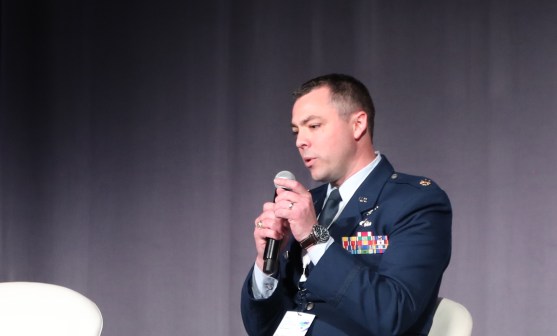Air Force strikes agreement with contractors to resell Platform One products

The Air Force has struck an agreement with six technology contractors to allow them to resell parts of its Platform One software development environment.
The deal with Booz Allen Hamilton, Seed Innovation, BrainGu, Revacomm, Indrasoft and Novetta was made through a special framework that allows the government to give companies the authority to sell its technology. The arrangement allows contractors to resell two of the platform’s products, Iron Bank and Big Bang, which advocates say could widen Platform One’s visibility across the Department of Defense.
The reselling agreement “enables them to reach out to more customers and provide the services for people to deploy Big Bang into their own environment,” said Marlu Oswald, president of Seed Innovation.
Platform One’s DevSecOps approach uses Kubernetes and container hardening, complex tech that if used right can yield highly secure, agile software development tools. Iron Bank is the platform’s container repository, and Big Bang is a DevSecOps pipeline that can be used in any environment.
The arrangement was struck through an Other Transaction Agreement between Platform One and Catalyst Campus, a nonprofit that will work to improve the products. Basic ordering agreements were signed in late September with six companies to sell, customize and deploy the products to customers and provide feedback to Catalyst on improving the tech. Platform One’s role will be to focus on the governance and policy of the platform, Joey Arora, a program manager at Platform One that assisted the effort, said in an interview.
“This increases our ability to deliver with trusted partners,” Arora, who is a contractor, said. He added this has been in the works for more than a year as the office tried to expand its user base.
Seed Innovation’s Oswald said her company is already deploying products with Northern Command, the PEntagon’s Joint AI Center and others.
In an interview with FedScoop, Booz Allen Hamilton Vice President Ki Lee said that he is also seeing demand across industry, DOD and civilian customers, but did not name them. Booz Allen will also provide container hardening services to companies that want to get their code into Iron Bank, Lee said.
“Having a government-owned product that we can go sell as a product, there is value-add to that for the government,” Lee said of the arrangement.
Platform One is largely built on open-source and propriety software that was built into a government-owned tech development stack. The companies selected had previously worked with Platform One through other agreements to do similar work on products.
Previously, Platform One’s office arranged the deployment of the environment and products directly to customers, contracting work with industry to assist their efforts. In that case, it offered a platform-as-a-service, Party Bus, but that is not a part of this latest reselling agreement, so customers will need their own environment.
“It’s basically customizing what gets deployed into their environment,” Oswald said of the work Seed is doing to deploy Platform One products. Seed also works to deploy third-party applications in a customer’s environment.
Oswald said that when Seed makes a sale to a customer to deploy a Platform One product, a cut of it goes back to improving the product. She said the percentage changes each time and couldn’t provide an average.
Lee did not comment on its contractual arrangement with Platform One, saying details were still being worked out.
“The government is maturing the model right now,” he said.
Arora didn’t provide details on the financial arrangement but described it as a “joint investment from the resellers that goes to the nonprofit.”




